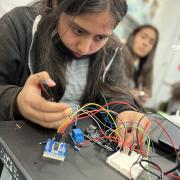Mechatronics, Sensors & 3D Design and Printing



The Intelliplant stands as a testament to collaborative innovation, bringing together the expertise of the mechatronics, sensors, and design teams. This multidisciplinary effort, with each subgroup focusing on specific aspects, allowed an all-girls team to harness peer-conducted research and construct Intelliplants—self-watering plant pots powered by Arduino with real-time monitoring capabilities. This intricate project utilizes an array of components, including Arduino UNO, relay, neopixels, photoresistor, soil moisture sensor, LED matrix, water pump, and power adapter. The project's functionality is embedded in the synergy between hardware and software. The photoresistor captures sunlight data, while the soil moisture sensor and LED matrix collaborate to communicate the plant's hydration and sunlight needs through a binary-coded language. Real-time information is visually presented on a 3D-printed LED matrix casing, protecting internal components from water exposure. The project's creation stemmed from a practical need—to care for a chosen plant during the summer break. The team aimed to create a self-sufficient system that not only waters the plant autonomously but also signals when the water tank is low, prompting timely refills to prevent dehydration. Selecting a plant for the project required thorough research into its specific care requirements. The project unfolded systematically. The mechatronics aspect, ensuring proper circuitry, was a priority, followed by sensor integration through code and hardware components. Constructing the water tank system involved soldering the water pump to the relay and soil moisture sensor, enabling automated watering based on the soil's hydration level. It’s important to note, that before physical assembly, the team used an open-source simulator, TinkerCAD, to validate circuit functionality virtually. The 3D printing process, using the Flashforge Inventor II, added both aesthetic and functional dimensions to the project. The printer's safety features, such as an intelligent sensor pausing printing when the door is opened or closed, proved crucial in an educational setting. The incorporation of biodegradable PLA filament highlighted the team's commitment to environmental sustainability. Throughout the project, the team encountered challenges that tested their resilience and problem-solving skills. Identifying a reversed relay component causing a malfunctioning water pump showed the importance of perseverance and collaborative troubleshooting. Through mentorship and mutual support, the team overcame these obstacles to bring to life a fully functional self-watering plant system—the Intelliplant. For the team members, predominantly coming from a low-income community with limited STEM guidance and female representation, this project holds profound significance. Their determination to venture into STEM fields and bridge existing gaps is encapsulated in the success of the Intelliplant. The experience served as a transformative gateway for all four seniors, inspiring them to pursue higher education in Computer Science and Biology in college. In conclusion, the Intelliplant project is not just an engineering achievement but a symbol of dedication, collaborative spirit, and the capacity to overcome challenges. As the team passes the torch to new students, they aspire to inspire, emphasizing that, no matter the background or gender, everyone is capable of mastering and applying STEM principles. The Intelliplant project's success, achieved through hands-on learning, stands as a guiding light for future students to explore and excel in the vast realm of STEM.
